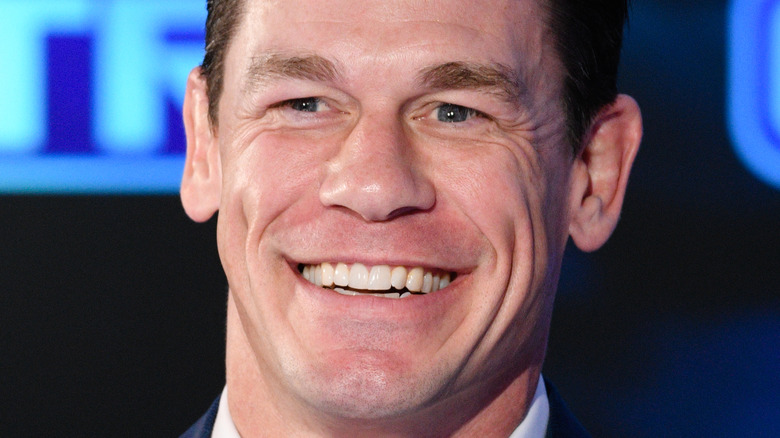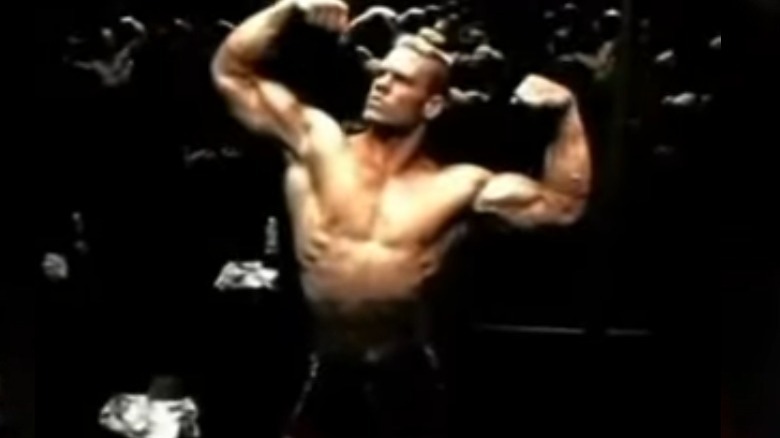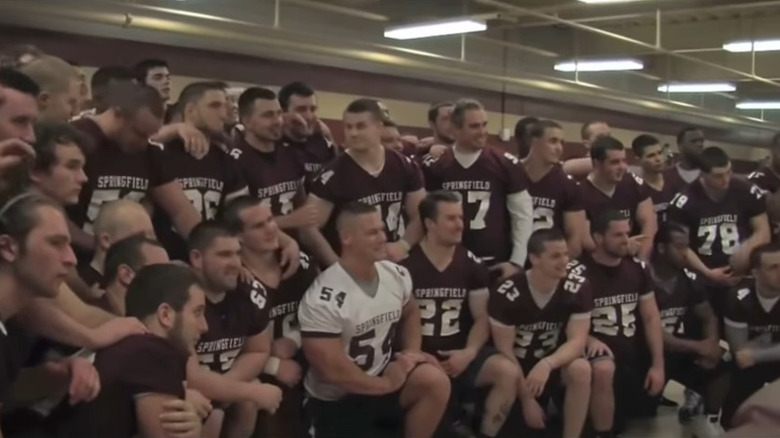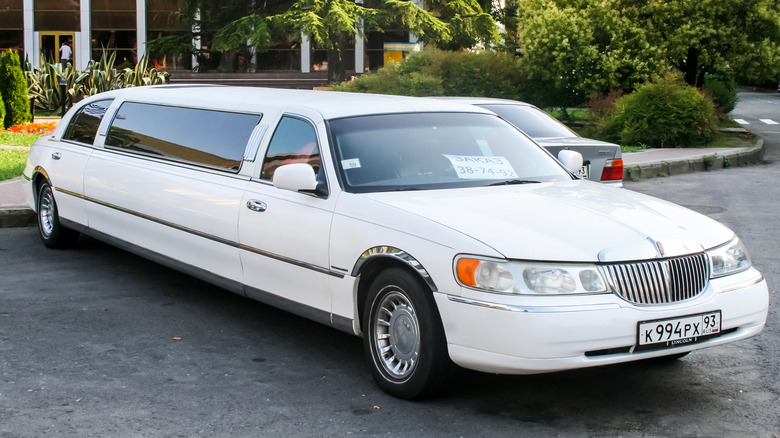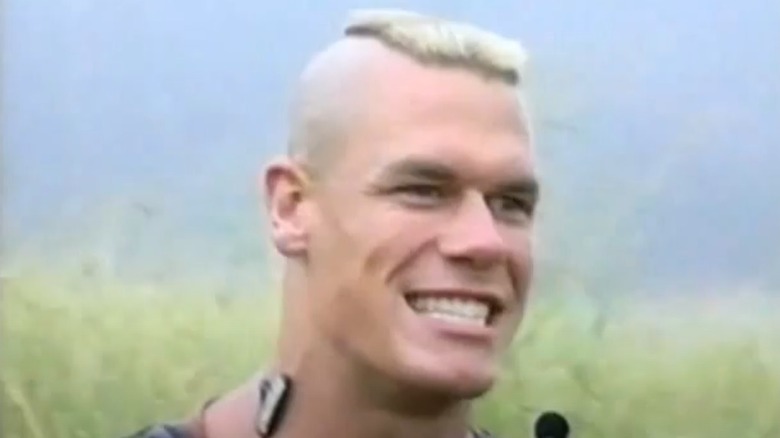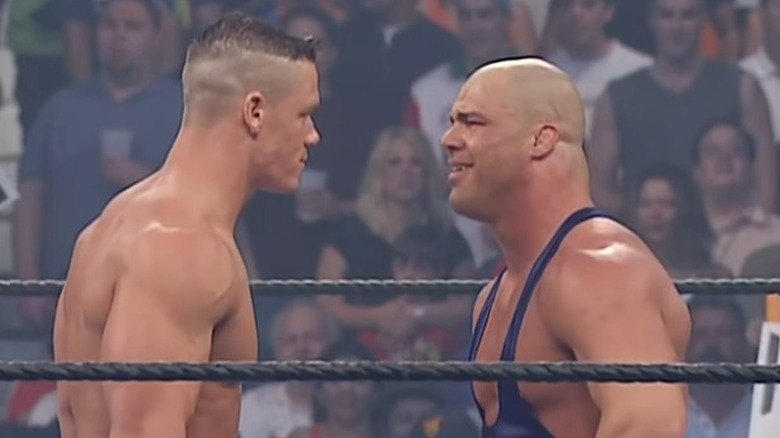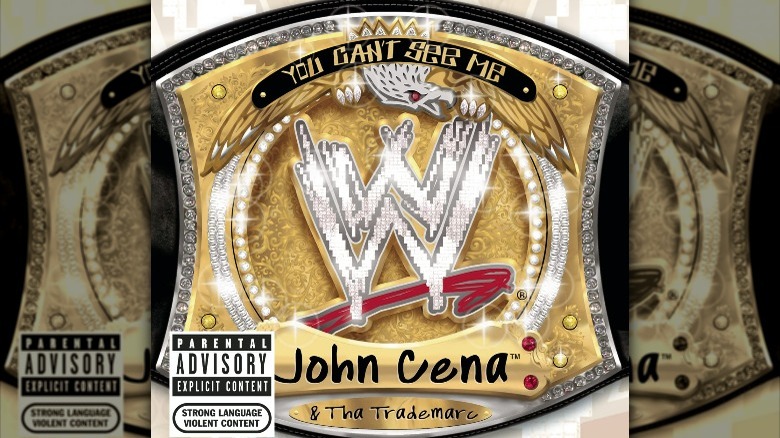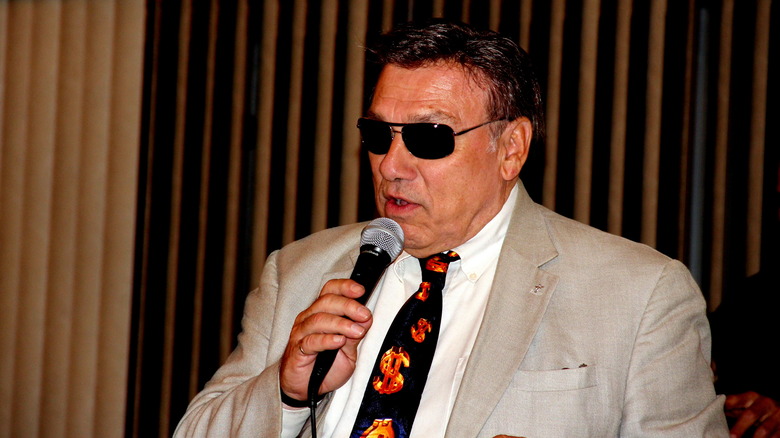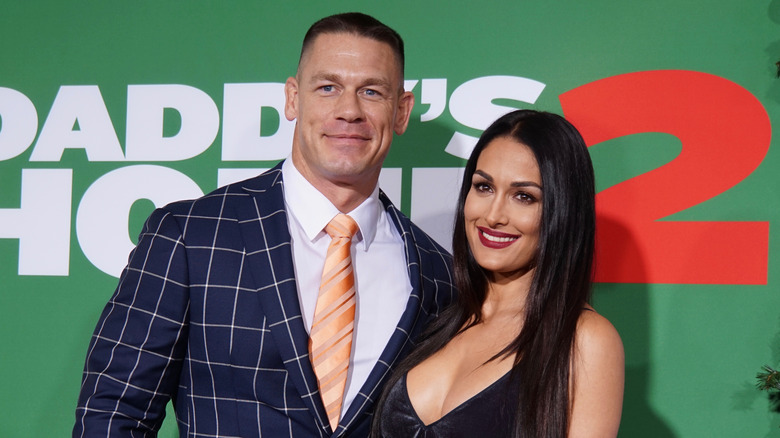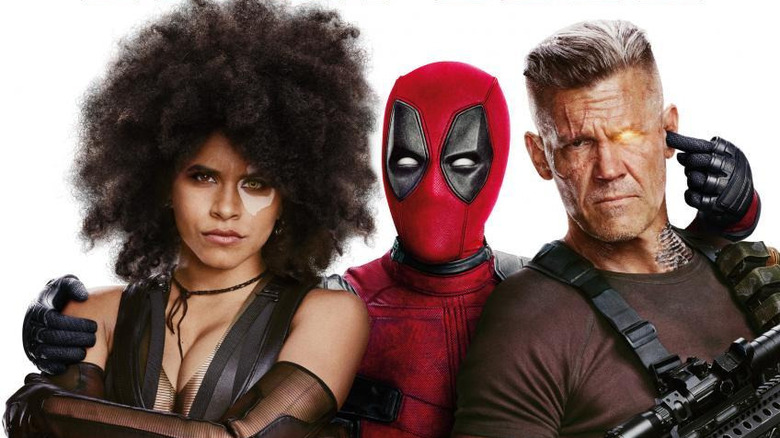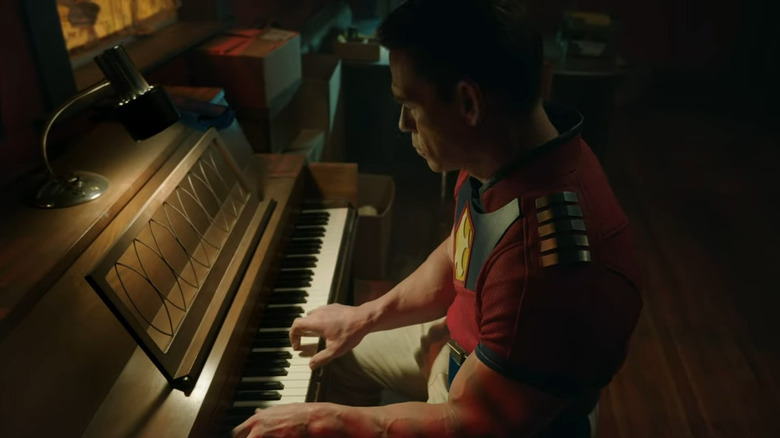Facts You Probably Never Knew About John Cena
John Cena recently celebrated his 20th year in WWE, and the commemoration on Monday Night Raw made for one of the greatest victory laps for any professional wrestler in recent memory. Vince McMahon even went as far as to call Cena "the greatest of all time," and given his body of work over that span and 16 world championship reigns to his name, an argument can certainly be made for Cena. While this much is debatable, Cena is generally recognized as one of the last true stars WWE ever produced.
Cena's significance in wrestling lore and value to WWE extends far beyond his in-ring exploits, however. He became the first celebrity to grant 650 wishes for the Make-A-Wish-Foundation in June 2022, and has long been an ally of Susan G. Komen, a breast cancer organization in the United States. Cena is also a rising star in Hollywood. "Peacemaker," a spin-off series in the DC Extended Universe, drew rave reviews from critics less than a year after the pro wrestling juggernaut made his debut in the "Fast & Furious" franchise. Few celebrities rival Cena's visibility over the last 20 years, and yet there is so much more to the man than many fans realize.
Here are 12 facts you probably didn't know about John Cena.
John Cena's bodybuilding origins
With one look at Cena's physique, it becomes quickly apparent that weight training is something that has long been a part of his life. In fact, Cena told Jimmy Fallon of "The Tonight Show" he began his journey in weightlifting and later bodybuilding at the age of 12 after his grandfather convinced his father to buy him a weight bench. After working up the confidence to start going to public gyms, people started to convince Cena to take up competitive bodybuilding. Cena went on to enter his first bodybuilding competition at 21, and there is still plenty of readily available footage from the event to prove it.
Cena's competition physique paints a much leaner picture than the size fans began to recognize him for during his WWE run. NXT superstar Cameron Grimes recently told Sportskeeda a story about catching a t-shirt from Cena at a live event only to find the shirt read size "XXXL" despite still being tight around his arms. Though Cena's bodybuilding career was short-lived, it proved to be a necessary step towards getting his foot in the door in professional wrestling, as his incredible look caught the eye of Ultimate Pro Wrestling's Rick Bassman, who had previously discovered future megastars such as Sting and The Ultimate Warrior. Bassman and UPW's connections to WWE talent scouts such as Jim Ross ultimately led to Cena getting signed to a developmental deal with the industry leader, and the rest is history.
John Cena was a Division III All-American
It is no secret that many of the top stars in wrestling come from an American football background, and Cena is no exception. However, unlike contemporaries such as The Rock and Roman Reigns, football was never the first career choice for him, and as a result, his prolific career in NCAA Division III is often glossed over or not talked about at all. Cena starred at center for the Springfield College Pride through the 1998 season, graduating in 1999 with a degree in exercise physiology and body movement.
Cena got his first taste of locker room leadership as a tri-captain for the Pride during the 1998 season in which the team won nine games, leading to the program's first-ever trip to the NCAA Tournament. For his on-field efforts, Cena would be named a Hewlett-Packard Division III First-Team All-American that season as well as an ECAC New England/Northeast Division III All-Star. Off the field, Cena was every bit as good, earning Freedom Football Conference All-Academic team recognition three times in four years. Despite his place among the top Division III centers of his time, Cena never considered a career in football, recognizing he was too small to play the center position at the next level, although his college football career lives on through any of his merchandise donning the number "54."
His time as a limo Driver
While attending Springfield College in his native Massachusetts, Cena worked as a limo driver to help pay the bills. However, his short time driving Lincoln Town Cars to and from the Boston Logan International Airport proved to not be a very fruitful endeavor. In fact, Cena would be regularly berated by passengers for showing up two-and-a-half hours late for flights. "I earned every single expletive that was given," Cena said during an appearance on "The Drew Barrymore Show." "I gotta hand it to the passengers. They came up with some new stuff I had never even heard, and I grew up with four brothers."
Cena confessed that having grown up 90 minutes north of Boston, he had never been to the city as a kid and had trouble finding his way around town in a pre-GPS era. As tough of a time as he had with navigation, however, the limousine experience proved to not be much better, as his town car reeked of steamed chicken breast and tuna fish as a result of his strict bodybuilding diet at the time. Other odd jobs of Cena's youth included stints as a golf course groundskeeper and ice cream scooper, but thankfully none of those jobs resonated to Cena much in the same way pro wrestling did.
Go West, Young Man?
In spite of comments he has made about The Rock's Hollywood pursuits (which he has since publicly apologized for), Cena initially packed his bags and headed out west to pursue a career in acting himself, eventually turning to wrestling after being encouraged to do so by fellow gym goers. Upon arriving in Southern California, he was able to quickly land a job at Gold's Gym in Venice Beach, but wound up homeless just as quickly due to the high cost of living. As a result, Cena resorted to long work shifts before retiring to his new home, a 1991 Lincoln Town Car where he would spend his nights before waking up at the crack of dawn to repeat the process the next day. "I went through my resources quickly and had to think on my feet," Cena told The U.S. Sun. "I didn't want to go home crying."
Cena recounted his typical work day during an appearance on "Jimmy Kimmel Live" in December 2018. The east coast transplant would work multiple shifts between 4 a.m. and midnight, taking advantage of gym facilities and workout equipment between shifts. Eventually, the suggestion was made that he enter the world of professional wrestling, a world which was not exactly foreign to him given father John Cena Sr.'s immense fandom during the younger Cena's formative years.
Manhunt
Cena's wrestling career kicked off when he linked up with UPW's Bassman, who doubled as an agent for many of the top talent to walk through his doors dating back to the 1980s. Although Cena's main goal thereafter was to earn a WWE contract, Bassman typically kept an ear to the ground for other ways for his stars to earn a living in the meantime. With Bassman serving as the go-between, a cash-strapped Cena earned a role as the host of upstart UPN reality TV show "Manhunt," appearing on the channel for the first time not as John Cena the Smackdown Superstar, but as "Big Tim Kingman" the bounty hunter.
The show's contestants were depicted as "fugitives" having to make it across Big Tim's island, with a $250,000 cash prize awaiting the sole survivor at the end of the competition. Cena, along with several other actors portraying bounty hunters had the job of "hunting down" trespassers on the island with paintball guns. The show ended up being a colossal flop, making it just six episodes before being canceled by the network, and the experience created a lifelong rift between Cena and Bassman over money. Bassman told the WINC Daily Podcast Cena made a snide remark to him after receiving news of the deal, though it is not known if this had to do with Cena being unimpressed by the figure or Bassman taking 10 percent of the $40,000 payday.
WWE nearly cut bait
For as big of a global superstar as Cena has become, many would be surprised to hear how close WWE came to pulling the plug on the John Cena experiment. Despite having had less than three years of wrestling experience and hardly a year in WWE's developmental territory Ohio Valley Wrestling, the company quickly promoted Cena to the main roster. From there, Cena had no trouble building momentum, thanks to an electric in-ring debut against Kurt Angle followed by an on-screen backstage interaction with The Undertaker. For a short while, Cena appeared to be the can't-miss star Director of Talent Relations Jim Ross portrayed him to be after scouting him in UPW.
Eventually, the shine of his big debut began to wear off, and all that remained was an intense, muscle-bound young man in tights absent of any personality. "[Cena] was called up too soon, which everyone knew, and there's political reasons why that happened, and it nearly cost him his career," Dave Meltzer of the Wrestling Observer Newsletter wrote. "If it wasn't for Stephanie McMahon taking a liking to him after they'd just about decided to let him go, he could've been gone." Cena himself does not dispute this. A fateful encounter in the back of the bus during a European tour led to Cena discovering his ability to freestyle rap, which became the basis of the "Doctor of Thuganomics" character that caught on like wildfire and ultimately saved his job.
His rap album
One fact about Cena WWE probably does not want current fans to know is that he recorded a successful rap album jointly published under the WWE Music Group label as well as Columbia Records. "You Can't See Me" featured 17 tracks of Cena and his cousin Marc "Tha Trademarc" Predka rapping about girls, their childhood, and their mic skills, among other themes. The lead single "The Time is Now" might sound familiar to wrestling fans, as it replaced Cena's old theme "Basic Thuganomics" as the star's theme song in April 2005 and has stuck ever since as one of the most recognizable wrestling themes of all time. A lawsuit came about over samples used in the song in 2008, with rap duo M.O.P. eventually dropping the suit two months after filling.
As for the album itself, the excess of profanity has likely caused WWE to distance itself from the project, especially considering Cena's gradual evolution from rapper to a more family-friendly ally to advertisers. The record received mixed reviews from critics, but debuted at No. 15 on the Billboard 200 charts, with over 143,000 copies sold in the first week of release.
John Cena Sr.
The origin of Cena's interest in pro wrestling can be traced back to his father, John Cena Sr., a fanatic wrestling fan during the industry's boom period in the 1980s. While many American families would have discouraged their children wrestling one another throughout the house, wrestling was encouraged in the Cena household. In fact, Cena told Howard Stern in a 2006 interview that his father was the first person to encourage him to take an interest in wrestling, despite being an otherwise strict parental figure.
John Cena Sr. would go on to be involved with some of his son's storylines over the years at a time when WWE would typically use actors to "portray" a wrestler's parents, such as Torrie Wilson's father Al and Shelton Benjamin's "momma." One such storyline saw Edge and Lita perform a home invasion on Cena's childhood home ala Steve Austin-Brian Pillman to which Edge once told a hilarious story on working with the senior Cena on his now-defunct podcast, "E&C's Pod of Awesomeness." Many would be surprised to learn this was Cena's actual father, and to Cena Sr.'s credit, he managed to parlay his son's newfound fame (as well as his brief time in the spotlight) into a career that has seen him become a manager on the local indy scene. He has recently managed Jora Johl, a wrestler who has made sporadic appearances in AEW, as well as former WWE superstar JTG.
His social media philosophy
Cena uses social media just as most other modern celebrities would, but if he had it his way, he would have never started his Instagram account. The irreverent account where Cena posts images "without explanation, for your interpretation" came about after WWE mandated his involvement in the platform, wanting to add the "johncena" handle to their social media portfolio. Feeling "maxed out" on Facebook and Twitter, Cena told Ellen DeGeneres he agreed to start the account, but that he would do it "his way." "His way" has led to numerous hilariously random posts, some of which may have a deeper meaning while others simply are what they are. The randomness led to Cena's popular "Stone Cold Friday" posts, where he posts a superimposed image of someone or something over the head of Steve Austin.
Cena takes a slightly different approach with his Twitter account. In spite of the evergreen nature of his tweets, Cena does, in fact, run his own Twitter account unlike some of his contemporaries. While some of his tweets may come off as overproduced motivational jargon, they are all ideas Cena has either heard or thought of, and all of the tweets come from a place of empathy. "Two years ago, I openly decided that I would use Twitter for a little bit of self-promotion and then as a journal," Cena told Delta Sky magazine (via CNBC) in 2019. "[I'm] trying to tip the balance of the social platform a little bit more toward the positive."
House Rules
Fans of the wrestler turned actor got a better look at the man behind the character when Cena appeared on "Total Bellas," back when he was romantically involved with fellow WWE talent Nikki Bella. While filming the show, Bella moved in with Cena, but upon doing so had to submit herself to Cena's "house rules," which painted Cena as more of a "Type A" personality than anybody could have realized. Such rules involved household members and guests having to dress in formal attire for dinner, elongated periods of stretching, each person maintaining their own assets and the need for two separate hampers for "nice" and "sweaty" clothes.
Cena also required Bella to sign a 75-page contract, causing Bella to question whether or not Cena intended on committing to her forever. Of course, the contract did not prevent Cena from proposing to Bella at WrestleMania 33, but Cena has since told "Today" that he regretted making his former partner sign the agreement. According to Bella, contents of the agreement included her being referred to as "the guest" and an edict to immediately vacate the house in the event of a breakup. Cena and Bella called off their engagement in April 2018 and are currently married to other people.
He was rejected by the MCU and DCEU
After years of slowly phasing himself out as a full-time WWE superstar, Cena fulfilled his original dream of becoming a successful actor, landing the role of a lifetime as Peacemaker in "The Suicide Squad" from director James Gunn. He went on to reprise the role as the titular character in a spinoff TV series. However, "The Suicide Squad" does not represent Cena's first attempt to break into the superhero genre. He told the "Happy Sad Confused Podcast" he had been rejected from superhero roles several times, even going as far as to give examples of roles he didn't quite make the cut for.
"'Shazam' is certainly one," Cena said. "I think like a child, so Shazam was super interesting to me." Actor Zachary Levi ended up taking the role of Shazam. Cena also attempted to break into the Marvel Cinematic Universe, trying out for the role of "Cable" in "Deadpool 2" with Josh Brolin ultimately landing the role. As has been the case for many fork-in-the-road scenarios in Cena's pro wrestling and film career, everything worked out in the end with "The Suicide Squad" being met with immense critical acclaim. Despite the movie's status as a box office disappointment, Samba TV reported the film was streamed in 5.1 million households globally during its first month on HBO Max.
Cena is a pianist
One of the most powerful scenes in "Peacemaker" came when a pensive Peacemaker, alone in a room, turns to a grand piano and starts playing a somber rendition of "Home Sweet Home" by Mötley Crüe to bring the episode to an end.
Many questioned whether or not it had been Cena actually playing piano or if the scene had been shot in a way to make it appear as if he was, but series creator James Gunn quickly put the rumor to bed with an incredible story about how he discovered Cena's hidden talent.
"For those of you asking, yes, that was really @JohnCena playing the piano version of Motley Crue's 'Home Sweet Home' in the latest episode of #Peacemaker," Gunn tweeted the week the episode aired. The director went on to mention how during shooting of "The Suicide Squad," he flew home for a day to be with his terminally ill dog. While the two sat in the hotel lobby bar waiting to be taken to the airport, Cena walked over to the piano and played what Gunn described as "the most beautiful rendition" of "Where is My Mind" by The Pixies. Gunn felt "crushed and soothed" all at once and wanted to convey a similar feeling in "Peacemaker." "The Suicide Squad" composer John Murphy composed the song for Cena to play on camera, meaning Cena also has the ability to read music in addition to being a prodigiously talented piano player.
